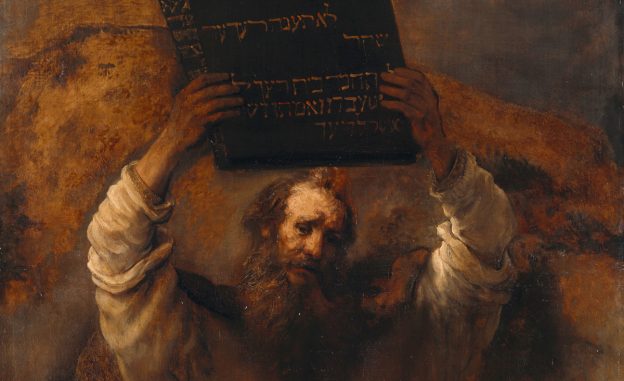Moses had boldly asked to see God in all his glory. While God could not grant this request – the created cannot comprehend the uncreated God – he did promise to allow Moses an encounter with a “shadow” of his glory.
In the first nine verses of chapter 34, Moses encounters God’s glory in a way he never had before. We see the preparations for the encounter, read of the encounter itself, and Moses’ reaction. While we can only understand it second-hand, the encounter with God and his attributes is one we all experience every day in Christ.
Moses’ intercession on behalf of God’s People had worked, and God had committed to accompanying them in a special way to the Promised Land. Since the relationship would be restored despite the terrible sin of the Golden Calf, the visible signs of God’s behaviour expectations needed to be remade.
The first set of stone tablets were destroyed at the foot of Mount Sinai, a visual act of the destruction of the relationship which Israel’s idolatry caused. So God instructed Moses to “cut for yourself two tablets of stone like the first, and I will write on the tablets the words that were on the first tablets, which you broke” (v.1).
Unlike the first set of tablets, these were hewn by Moses, although God himself wrote the terms of the covenant of both sets (one for God, one for the people). The importance of the tablets did not lie in who prepared them for writing, but who provided the message: God.
Moses needed to be ready for the encounter, which would happen the next morning at the top of Mount Sinai (v.2). To protect all other living beings, animal or human, Moses was to make sure that none of them even touched the foot of the mountain (v.3). God’s holiness was not something to play with.
Moses eagerly prepared for the encounter, which occurred the next day when Moses obediently went up the mountain with tablets in hand (v.4).
God’s majesty is immediately apparent in the fact that while Moses ascended high up a mountain, God had to descend to initiate the encounter (v.5, cf. Gen. 11). God descended in a glorious cloud and “and stood with him there” (v.5).
What followed was less of a visual inspection than a sermon describing God’s nature and being in terms of his attributes. There on the mountain, God “proclaimed the name of the LORD” (v.5). If we want to know what God looks like it is not through a painting in the Sistine Chapel, but by his perfect qualities.
God proceeded to reveal his perfect glory to Moses in the encounter on the mountain. Firstly he proclaimed his true covenant name: “The LORD passed before him and proclaimed, ‘The LORD, the LORD’” (v.6). Moses was encountering the God of Creation, but also the God who relates to his Creation and especially his People by a covenant relationship.
Next God declared he is “merciful and gracious” (v.6), that is compassionate and giving favourably even when undeserved.
God is also “slow to anger” or patient, allowing time for repentance before acting to judge sin, not like a human losing his temper.
God is also “abounding in steadfast love and faithfulness, keeping steadfast love for thousands” (vv.6-7). God showers his loving-kindness on his people, lovingly and faithfully. And not just a few, but a great many, far and wide!
God is also generous in “forgiving iniquity and transgression and sin” (v.7), referring to different categories of disobedience. Turning aside (sometimes out of ignorance or misguidedness), rebellion (transgression), and any kind of moral failure (sin). All of these God will forgive.
But God is also just. He will not “clear the guilty, visiting the iniquity of the fathers on the children and the children’s children, to the third and the fourth generation” (v.7). God will put things right and ensure the guilty (and all those tainted by it) receive their reward, even if they escape it in this life.
Confronted with God’s many perfections and glories, how did Moses respond? First, he “quickly bowed his head toward the earth and worshiped” (v.8). Like we should too, when presented with the reality of God’s glory.
Secondly, Moses pleaded once again for his sinful people, asking that God would remain with them, forgive them, and take them for his own always (v.9).
How incredible the whole scene must have been! I struggle to grapple with what it must have been like.
Thankfully, while we cannot experience the same vision as Moses, we do experience in a sense God’s perfections every day in Christ. Jesus, in whom God’s mercy and justice combined at the Cross, is the means through which we experience God’s forgiveness, his compassion, his graciousness, his faithful love, and his patience towards us.
In Jesus, we are able to enjoy a relationship with the Creator God who is also the God who redeems us for his own. Like Moses, we should quickly bow our heads and worship!


